The top diplomats from Japan, China and South Korea yesterday met in Tokyo, seeking common ground on East Asian security and economic issues amid escalating global uncertainty.
“Given the increasingly severe international situation, I believe we may truly be at a turning point in history,” Japanese Minister of Foreign Affairs Takeshi Iwaya said at the start of the meeting with Chinese Minister of Foreign Affairs Wang Yi (王毅) and South Korean Minister of Foreign Affairs Cho Tae-yul.
The three agreed to accelerate preparations for a trilateral summit in Japan this year that would also include talks on how Tokyo, Beijing and Seoul can tackle declining birthrates and aging populations, Iwaya said in a joint announcement after the meeting.

Photo: Reuters
The first gathering of the countries’ foreign ministers since 2023 was held as US President Donald Trump upends decades-old alliances, potentially opening the door for China to forge closer ties to countries traditionally aligned with Washington.
“Our three nations have a combined population of nearly 1.6 billion and an economic output exceeding US$24 trillion. With our vast markets and great potential, we can exert significant influence,” Wang said.
China wants to resume free-trade talks with its neighbors and expand membership of the 15-nation Regional Comprehensive Economic Partnership, he added.
However, deep divisions remain. Beijing is at odds with Tokyo and Seoul on several key issues, including its support of North Korea, its intensifying military activity around Taiwan and its backing of Russia in its war with Ukraine.
US allies Japan and South Korea, which each host thousands of US troops, share Washington’s view that China — the world’s second-largest economy — poses a growing threat to regional security.
Cho said he had asked China in the meeting to help persuade North Korea to abandon its nuclear weapons.
“I also stressed that illegal military cooperation between Russia and North Korea should stop immediately, and that North Korea should not be rewarded for its wrongdoings in the course of bringing about the end of the war in Ukraine,” he added.
Iwaya met separately with his Chinese and South Korean counterparts, including the first high-level economic dialogue with Beijing in six years.
A key issue for Tokyo in the talks with Beijing is a ban on Japanese seafood imports imposed by China after the release of wastewater from the destroyed Fukushima Dai-ichi nuclear plant.
Iwaya said he confirmed a commitment by China made in September last year to allow imports of marine products and also asked about expanding imports of Japanese agricultural products, including beef and rice.
“I emphasized that it is important to prioritize resolving those issues that can be addressed early,” Iwaya told reporters after the meeting.

Right-wing political scientist Laura Fernandez on Sunday won Costa Rica’s presidential election by a landslide, after promising to crack down on rising violence linked to the cocaine trade. Fernandez’s nearest rival, economist Alvaro Ramos, conceded defeat as results showed the ruling party far exceeding the threshold of 40 percent needed to avoid a runoff. With 94 percent of polling stations counted, the political heir of outgoing Costa Rican President Rodrigo Chaves had captured 48.3 percent of the vote compared with Ramos’ 33.4 percent, the Supreme Electoral Tribunal said. As soon as the first results were announced, members of Fernandez’s Sovereign People’s Party

MORE RESPONSIBILITY: Draftees would be expected to fight alongside professional soldiers, likely requiring the transformation of some training brigades into combat units The armed forces are to start incorporating new conscripts into combined arms brigades this year to enhance combat readiness, the Executive Yuan’s latest policy report said. The new policy would affect Taiwanese men entering the military for their compulsory service, which was extended to one year under reforms by then-president Tsai Ing-wen (蔡英文) in 2022. The conscripts would be trained to operate machine guns, uncrewed aerial vehicles, anti-tank guided missile launchers and Stinger air defense systems, the report said, adding that the basic training would be lengthened to eight weeks. After basic training, conscripts would be sorted into infantry battalions that would take

GROWING AMBITIONS: The scale and tempo of the operations show that the Strait has become the core theater for China to expand its security interests, the report said Chinese military aircraft incursions around Taiwan have surged nearly 15-fold over the past five years, according to a report released yesterday by the Democratic Progressive Party’s (DPP) Department of China Affairs. Sorties in the Taiwan Strait were previously irregular, totaling 380 in 2020, but have since evolved into routine operations, the report showed. “This demonstrates that the Taiwan Strait has become both the starting point and testing ground for Beijing’s expansionist ambitions,” it said. Driven by military expansionism, China is systematically pursuing actions aimed at altering the regional “status quo,” the department said, adding that Taiwan represents the most critical link in China’s

‘REALLY PROUD’: Nvidia would not be possible without Taiwan, Huang said, adding that TSMC would be increasing its capacity by 100 percent Nvidia Corp CEO Jensen Huang (黃仁勳) on Saturday praised and lightly cajoled his major Taiwanese suppliers to produce more to help power strong demand for artificial intelligence (AI), capping a visit to the country of his birth, where he has been mobbed by adoring fans at every step. Speaking at an impromptu press conference in the rain outside a Taipei restaurant, where he had hosted suppliers for a “trillion-dollar dinner,” named after the market capitalization of those firms attending, Huang said this would be another good year for business. “TSMC needs to work very hard this year because I need a lot